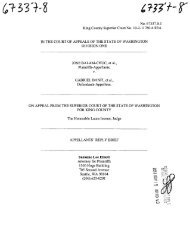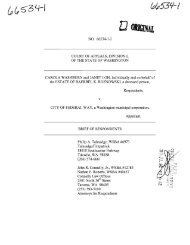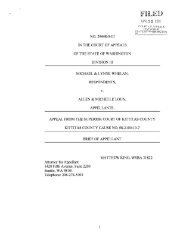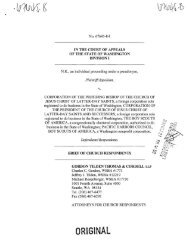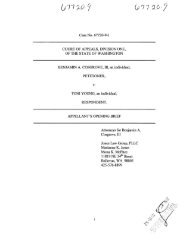Appellants' Reply Brief - Washington State Courts
Appellants' Reply Brief - Washington State Courts
Appellants' Reply Brief - Washington State Courts
Create successful ePaper yourself
Turn your PDF publications into a flip-book with our unique Google optimized e-Paper software.
By contrast, Policy 4.42 (see App. B to this brief) is squarely on<br />
point. Expressly relying on RCW 5 1.08.178(4) as its predicate statutory<br />
authority, this policy must be employed to "Establish Wages for Sole<br />
Proprietors, Corporate Officers and Partners." Thus, Malang's<br />
reliance on Department Policy 4.41 is misplaced.<br />
Policy 4.42 addresses the steps that must be taken to translate self-<br />
employment income into a wage-equivalent. The policy obligates<br />
Department adjudicators to investigate the employment pattern of the self-<br />
employed individual, to gather acceptable tax or payroll information, and<br />
to use that information to fairly determine an appropriate wage-equivalent<br />
for purposes of paying time loss compensation.<br />
Policy 4.42 reflects a thoughtful approach to determine wage-<br />
equivalents for those types of individuals - sole proprietors, corporate<br />
officers and partners - who do not receive a wage in the ordinary sense of<br />
the term, i.e., do not receive remuneration given by a separate employer to<br />
an employee for services. See AB at 29. Under Policy 4.42, in trying to<br />
fairly and reasonably determine a wage-equivalent per RCW 5 1.08.178(4),<br />
Department adjudicators are required to look at all relevant information,<br />
including:<br />
Tax records (which fairly represent work patterns)<br />
Payroll records (to identify wages paid to the worker)



